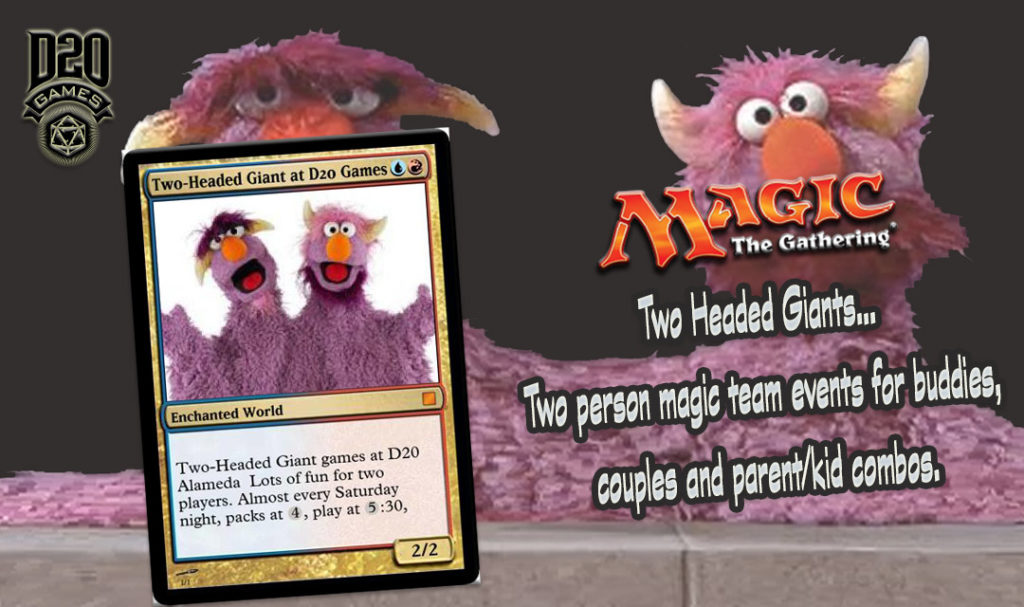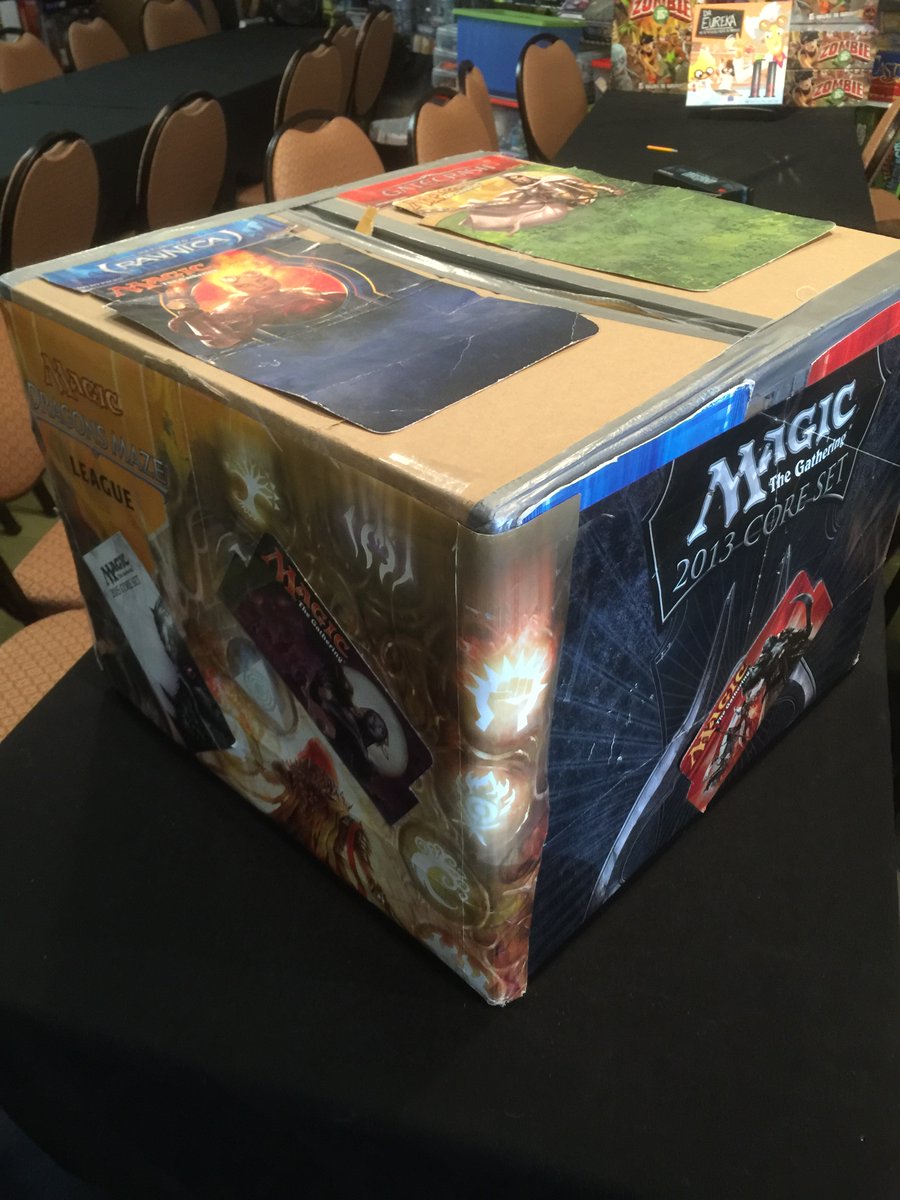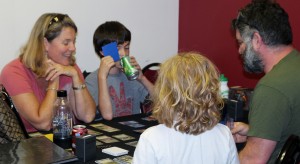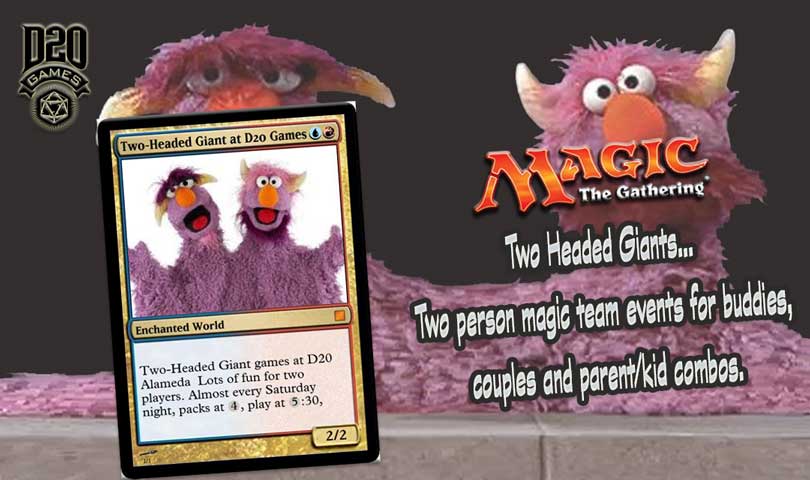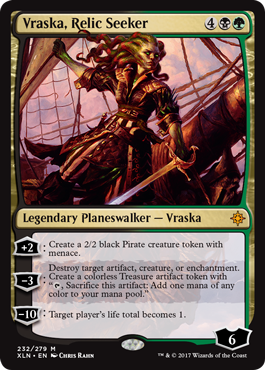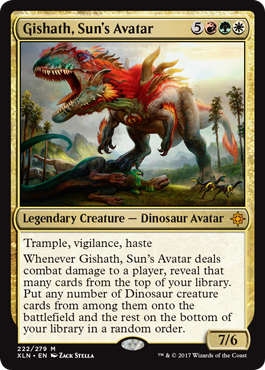By Ben Calica
This guide is designed as a simple, English translation for parents, significant others, and just those who felt curious as to what the heck D&D is all about. We run D&D Encounters at D20 Games these days, and I’m old enough to have played the game with the first white books back in the mid 70s. I’m also a dad of tween twin boys and a daughter who’s three years younger, so I can do the kid to parent translation pretty well. 😉
 What is D&D? Dungeons & Dragons is the game the popularized role playing. Created in the mid-70’s,D&D was unique in casting one of the players in the role of the Dungeon Master. A person who both kept the secrets of the world that the other players were trying to discover, and acted as a living interpreter of the rules, allowing players to try all sorts of creative solutions to problems they encounter, and not be limited by only what the original game creators set down on paper. This was quite literally a game-changer, in that it really allowed people to use their imaginations to inhabit characters that they created and moved through the world. It works best when the players access the freedom of their 8-12 year old selves and create characters that are ones they would have chosen to play on a playground. (BTW…those of us who were around for the first round of this remember the media frenzy over kids in the sewers doing horrible things. That was more made up then the game. The truth was it was a bunch of us utterly harmless little nerd boys and girls being imaginative in the basement of our parents houses.)
What is D&D? Dungeons & Dragons is the game the popularized role playing. Created in the mid-70’s,D&D was unique in casting one of the players in the role of the Dungeon Master. A person who both kept the secrets of the world that the other players were trying to discover, and acted as a living interpreter of the rules, allowing players to try all sorts of creative solutions to problems they encounter, and not be limited by only what the original game creators set down on paper. This was quite literally a game-changer, in that it really allowed people to use their imaginations to inhabit characters that they created and moved through the world. It works best when the players access the freedom of their 8-12 year old selves and create characters that are ones they would have chosen to play on a playground. (BTW…those of us who were around for the first round of this remember the media frenzy over kids in the sewers doing horrible things. That was more made up then the game. The truth was it was a bunch of us utterly harmless little nerd boys and girls being imaginative in the basement of our parents houses.)
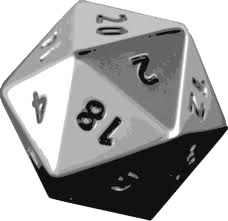
D20s-The rolls at the heart of role playing. The D20 that is the name of our store refers to 20-sided dice, and are the key to most role playing games. As much control as the Dungeon Master needs to have over the world that he/she is slowly unveiling, if they end up as the autocrat that just tells a story without any possibility of success or failure outside of what is ordained by them, the game becomes either stale or feels unfair. Instead, based on a characters developing abilities the Dungeon Master either consults pre-created tables of possibilities for certain types of actions (attacking with a sword, jumping out of the way of a dragon’s fire breath, getting a good nights sleep without being discovered by some roving band of creepy creatures), or makes their best guess for some creative idea a player has, and assigns a number that they must beat for that to succeed. “I want to use my special agility to do a back-flip over my friends head to the back of the group.” “Ok…you need to roll an 18 to make that happen. Since you have extra agility bonus..you get to add 4 to whatever you roll. Roll a d20!” It is the mix of imagination and estimated chance that is the heart of what makes role playing games ongoing fun, and a story that even the Dungeon Master doesn’t know how will play out.
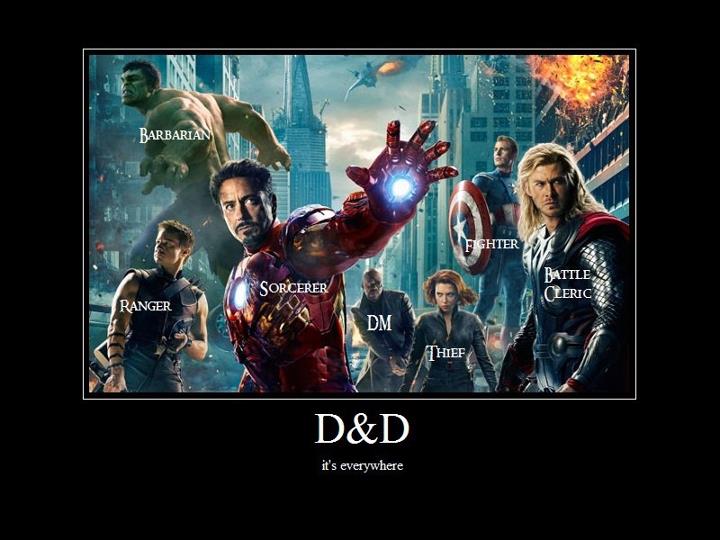
18 again, the birth of a character. The other key part of what makes role playing games fun, is the birth and evolution of your character. A few different methods can be used, from the genetic randomness of rolling dice to determine the basic DNA of your character. Are they quick smart, wise, strong charming, or tough, or some combo of the above. The first method involved rolling three six sided dice for each attribute, and then figuring out based on what you got what that character would be.
For example right now I’ll roll out one to show you.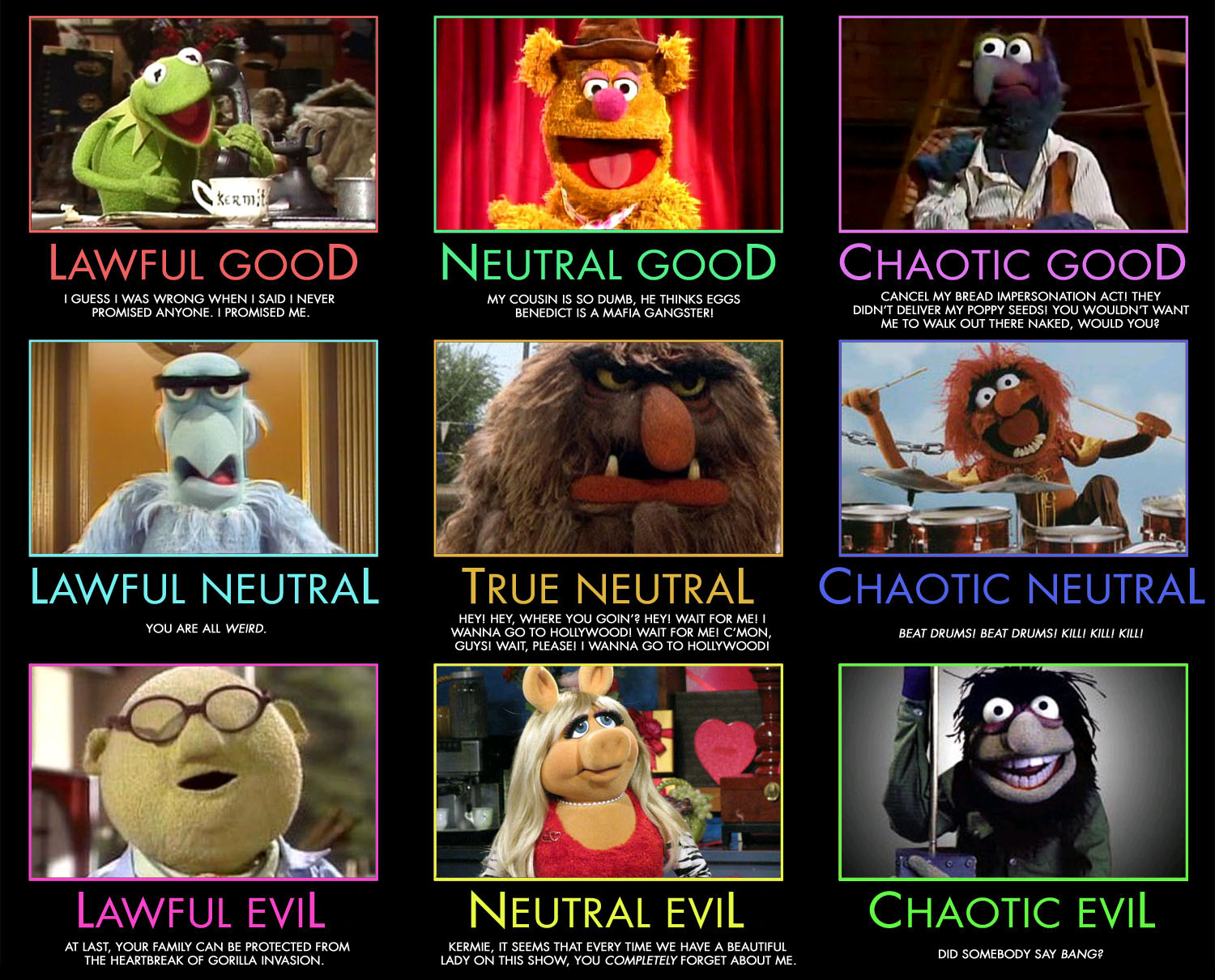
Well…obviously this guy is going to be hiding in the back of the group, not swinging anything bigger then a stick. But…with those Wisdom and Intelligence scores, looks like we might have a wizard or kind of skinny healer.
Using the more popular method of rolling 4 6-sided dice and throwing out the lowest one, we get a little better result.
This guy (or gal), could end up as a thief, or bard, or ranger, whose dexterity will make a bow sing in their hands. How the characters start out is only the birth, because as they go out in the world and experience interesting things, they gain, well, experience. and that experience directly leads to them increasing their levels, and with each of those new levels, their skills, toughness and abilities increase, so that the monsters that almost destroyed them in that first week of play, go running from them a few sessions later. The greater the risks, the greater the rewards in terms of experience points AND goodies that they find along the way. But those risks are very real (in the world of the game), in that if the hit points of your character (A number created based on your level, constitution, and what profession your character chooses), gets knocked down in battle to 0, then your character, well, dies. Most often in the early levels, your playing buddies (your group), will drag you back to town, and find a sufficiently powerful healer to bring you back. But that gets increasingly expensive both in terms of gold you’ve been able to collect, and eventually costing you some of those experience points you’ve been working so hard to gather. Plus that fact that during the rest of that particular adventure, when the DM asks each character what they want to do next, the answer from you is “lying in the corner…still dead.”
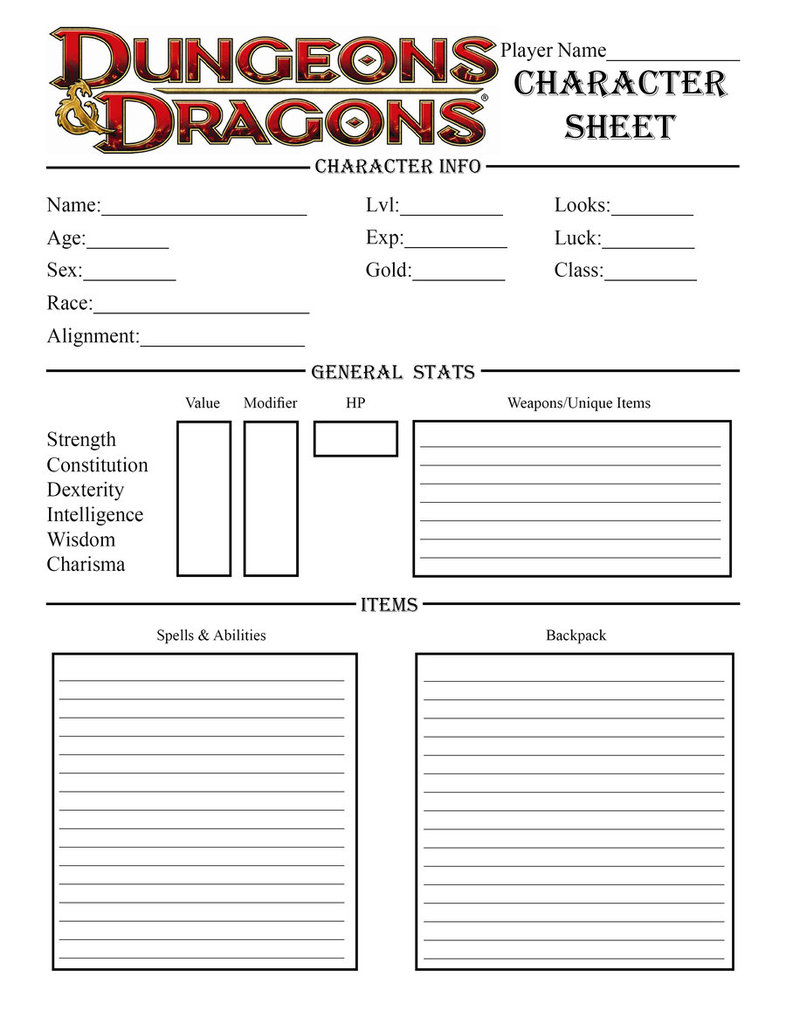 The DM–The guy that gets to have fun by not playing the whole time: The Dungeon Master, or DM, has a very important and sometimes tricky role. It is their job to have either created or familiarized themselves with the world and adventure that the players are going to encounter. They need to keep things moving at a good pace so people keep having fun in the world, and they have to strike a very careful balance between making the world so easy to defeat that there is no sense of real risk or drama, and making it so tough that the players feel like they are spending half their time trudging back to town to get resurrected They need to make puzzles that are solvable, but hard enough to be challenging, and they need to be open to the players creativity taking the story in a direction they didn’t anticipate. Common mistakes are to become the great and powerful OZ, manipulating the players into doing things they really don’t want to do, or being seen as vindictive and mean..being the enemy of the players, as opposed to their guide to a world they have never encountered. The best DM’s enjoy the story being told and it’s telling, and are open to knowing that the player’s creativity is a huge part of what makes that story fun for everybody, including them.
The DM–The guy that gets to have fun by not playing the whole time: The Dungeon Master, or DM, has a very important and sometimes tricky role. It is their job to have either created or familiarized themselves with the world and adventure that the players are going to encounter. They need to keep things moving at a good pace so people keep having fun in the world, and they have to strike a very careful balance between making the world so easy to defeat that there is no sense of real risk or drama, and making it so tough that the players feel like they are spending half their time trudging back to town to get resurrected They need to make puzzles that are solvable, but hard enough to be challenging, and they need to be open to the players creativity taking the story in a direction they didn’t anticipate. Common mistakes are to become the great and powerful OZ, manipulating the players into doing things they really don’t want to do, or being seen as vindictive and mean..being the enemy of the players, as opposed to their guide to a world they have never encountered. The best DM’s enjoy the story being told and it’s telling, and are open to knowing that the player’s creativity is a huge part of what makes that story fun for everybody, including them.
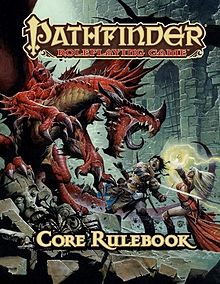 D&D vs. Pathfinder. Both of these games were born from the original D&D. While many people were kind of mad about D&D 4.0 (kind of an attempt to turn D&D into World of Warcraft) they redeemed themselves with 5th edition. It honors the best part of role playing games, the, well, role playing. Pathfinder is a game made by a different company that was founded by a number of people who used to work on D&D an has stayed very much in the spirit of the original D&D. The reality is that both of these are brothers in spirit, and you can’t really go wrong with either. There are also a host of other genres of role-playing that have been born from the same basic ideas and that speak to the different 8-12 year-olds in each of us.
D&D vs. Pathfinder. Both of these games were born from the original D&D. While many people were kind of mad about D&D 4.0 (kind of an attempt to turn D&D into World of Warcraft) they redeemed themselves with 5th edition. It honors the best part of role playing games, the, well, role playing. Pathfinder is a game made by a different company that was founded by a number of people who used to work on D&D an has stayed very much in the spirit of the original D&D. The reality is that both of these are brothers in spirit, and you can’t really go wrong with either. There are also a host of other genres of role-playing that have been born from the same basic ideas and that speak to the different 8-12 year-olds in each of us.
Special notes from one parent to another: First off…most any game that gets people face to face instead of screen to screen is a good thing. Second, the game is jam packed with creative problem solving and social skills building opportunities. The books are expensive (in the $30-40 range) and they will read them to the point of seeming obsession, but what is happening is that they are using the possibilities in the books to load themselves up with tools to solve problems when they play as well as doing creative thinking in their heads about what they could become. The games can go from a couple of hours a time, to 2 in the morning when they get older. It is the, “let’s just see what is behind that next door” that create that. Obviously, the timing issues are different based on the age of the kid.
It takes a lot to get a group of kids together on a regular basis to play, and once a game is going and gets healthy it is worth encouraging. Despite whatever “Revenge of the nerds” preconceptions there are about people who play, the reality is that the people who are drawn to the game do tend to be disproportionately bright, mostly because they don’t like the constraints that standard games place on their creativity. The groups also tend to provide good social support. The characters they create have different specific ethical rules, and it is important for the player to stay true to those rules, making for a great chance to explore and understand those. For the kids who are bright but have social skills challenges, the role playing stuff is wonderful, both because it provides some set of written rules for social interactions, and because usually the DM provides a level of moderation for social issues that come up that makes the sessions mini-social skills groups wrapped in a big spoonful of sugar.
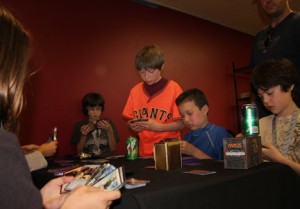 It’s not called Date Night magic for the kids. This is kids magic draft is chance for kids to play like the adults in an event with their peers, and for the parents to get a chance to go remember what it’s like to be adults again.
It’s not called Date Night magic for the kids. This is kids magic draft is chance for kids to play like the adults in an event with their peers, and for the parents to get a chance to go remember what it’s like to be adults again.

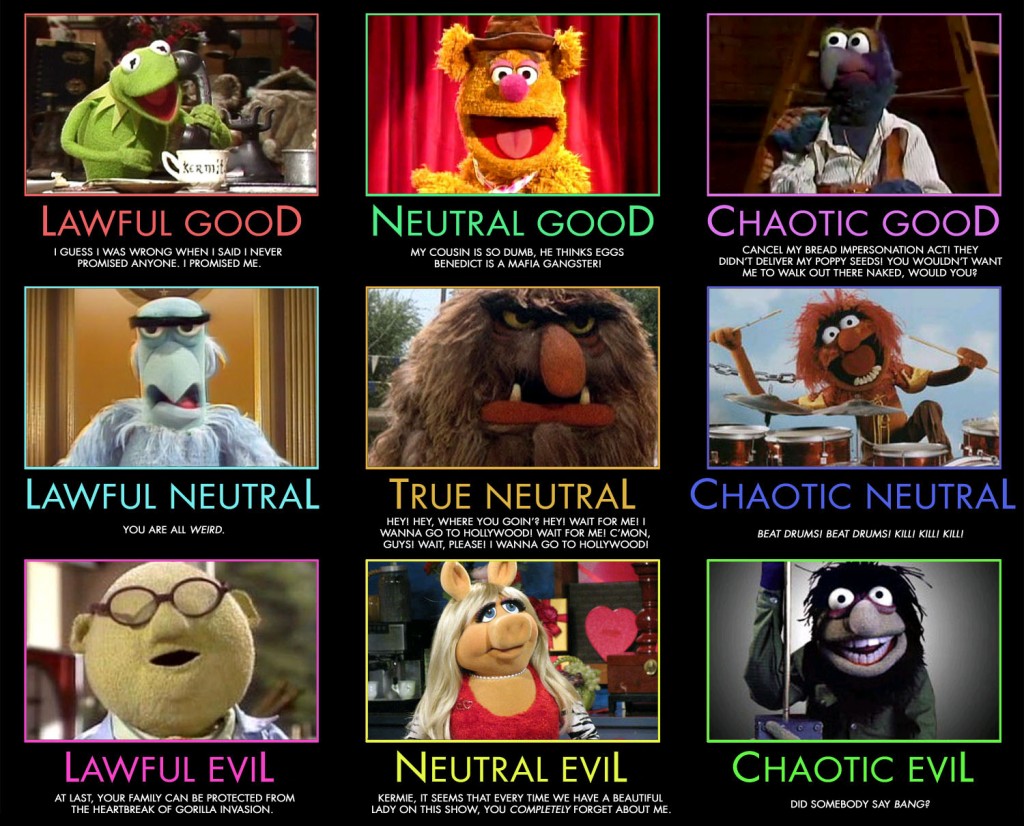



 The DM–The guy that gets to have fun by not playing the whole time: The Dungeon Master, or DM, has a very important and sometimes tricky role. It is their job to have either created or familiarized themselves with the world and adventure that the players are going to encounter. They need to keep things moving at a good pace so people keep having fun in the world, and they have to strike a very careful balance between making the world so easy to defeat that there is no sense of real risk or drama, and making it so tough that the players feel like they are spending half their time trudging back to town to get resurrected They need to make puzzles that are solvable, but hard enough to be challenging, and they need to be open to the players creativity taking the story in a direction they didn’t anticipate. Common mistakes are to become the great and powerful OZ, manipulating the players into doing things they really don’t want to do, or being seen as vindictive and mean..being the enemy of the players, as opposed to their guide to a world they have never encountered. The best DM’s enjoy the story being told and it’s telling, and are open to knowing that the player’s creativity is a huge part of what makes that story fun for everybody, including them.
The DM–The guy that gets to have fun by not playing the whole time: The Dungeon Master, or DM, has a very important and sometimes tricky role. It is their job to have either created or familiarized themselves with the world and adventure that the players are going to encounter. They need to keep things moving at a good pace so people keep having fun in the world, and they have to strike a very careful balance between making the world so easy to defeat that there is no sense of real risk or drama, and making it so tough that the players feel like they are spending half their time trudging back to town to get resurrected They need to make puzzles that are solvable, but hard enough to be challenging, and they need to be open to the players creativity taking the story in a direction they didn’t anticipate. Common mistakes are to become the great and powerful OZ, manipulating the players into doing things they really don’t want to do, or being seen as vindictive and mean..being the enemy of the players, as opposed to their guide to a world they have never encountered. The best DM’s enjoy the story being told and it’s telling, and are open to knowing that the player’s creativity is a huge part of what makes that story fun for everybody, including them.
